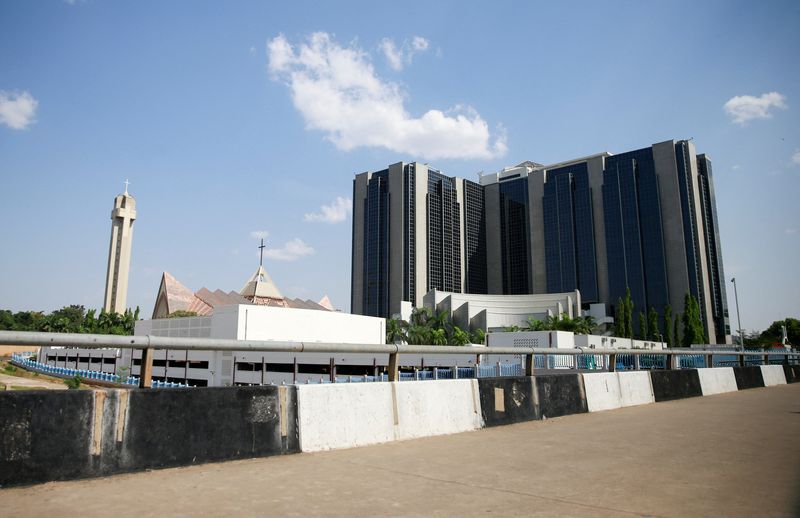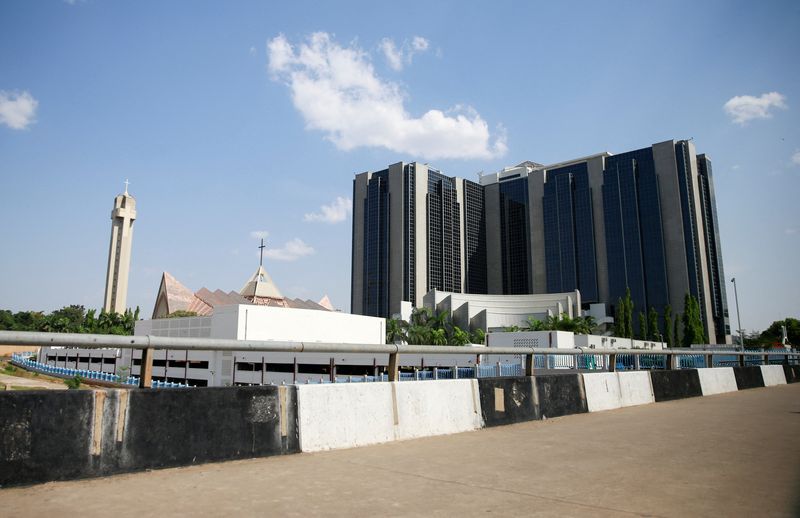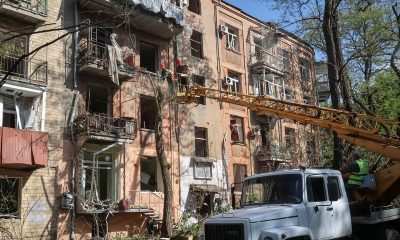Economy
Nigeria cenbank to tighten policy to curb inflation, asks banks to boost capital


© Reuters. FILE PHOTO: A view of Central Bank of Nigeria headquaters next to National Ecumenical Centre in Abuja, Nigeria November 23, 2021. REUTERS/Afolabi Sotunde/File Photo
By Chijioke Ohuocha and Elisha Bala-Gbogbo
ABUJA (Reuters) -Nigeria’s central bank will tighten policy over the next two quarters to manage inflation while directing banks to boost capital to support an expansion of the economy, its new governor, Olayemi Cardoso, said on Friday.
Cardoso, who took over in September, faces immediate pressure to curb excess liquidity in the banking system and tackle inflation, which has risen for 10 consecutive months, reaching 27.33% in October, the highest in about 18 years.
Outlining his policy thrust, Cardoso told bankers the Central Bank of Nigeria (CBN) would stop direct fiscal interventions that have blurred the lines between monetary and fiscal policy and undermined its ability to manage inflation, discontinuing the much-criticised unorthodox policies pursued by his predecessor, Godwin Emefiele.
The CBN has “approved the adoption of an explicit inflation-targeting framework to enhance the effectiveness of our monetary policy… Details and requirements for this framework are currently being finalised along with the fiscal authorities,” he said in the commercial hub of Lagos.
Cardoso said the west African nation’s economy could grow to $1 trillion over the next seven years and that lenders required extra capital to play in a bigger economy.
Nigeria’s $240 billion economy recorded third-quarter growth of 2.5% on Friday, barely changed from the previous quarter, as its loss-making dominant oil sector contracted at a much slower pace while government reforms were yet to take effect.
Africa’s largest economy could grow by 3.9% in the fourth quarter, Cardoso said.
“The Central Bank of Nigeria is fully committed to ensuring price stability and financial system stability,” he said. “We will tackle institutional deficiencies, restore corporate governance, strengthen regulations and implement prudent policies.
Cardoso pledged to focus on rebuilding trust at the regulator, manage liquidity to curb inflation, bring down high interest rates and stabilise the exchange rate.
“We are taking measured and deliberate steps to send the right signals to markets,” he said, assuring investors that the economy will “experience significant stability in the short to medium term as we recalibrate our policy toolkit and implement far-reaching measures.”
President Bola Tinubu has embarked on Nigeria’s boldest reforms in decades by scrapping a popular but costly subsidy on petrol and a system of multiple exchange rates which had kept the currency artificially strong, curbed trade and growth.
Cardoso said reforms, which have worsened hardship for the population, will contribute to a stable exchange rate and improve macroeconomic stability.
The CBN has raised interest rates more than 700 basis points since last year to fight inflation. Cardoso said month-on-month inflation had started to fall and that his team had worked on measures to ensure rates feed through to the economy.
On Nov. 2, the central bank began settling overdue currency forwards, estimated at about $7 billion, which corporates bought from local lenders. Banks then repaid foreign credit lines with their own funds when the central bank did not pay out.
At least 31 banks were paid in the first tranche of settlements, Cardoso said, in a bid to relieve pressure on the naira, which has been in free fall on the unofficial parallel market.
“These payments will continue until obligations are cleared,” he said.
The governor said he would allow market forces to determine exchange rates as the CBN aims to set clear, transparent and harmonised rules governing market operations.
“New foreign exchange guidelines will be developed and extensive consultations will be done with banks and FX operators before implementing any new requirements,” Cardoso said.
($1 = 839.54 naira)
Economy
Russian central bank says it needs months to make sure CPI falling before rate cuts -RBC


© Reuters. Russian Central Bank Governor Elvira Nabiullina attends a news conference in Moscow, Russia June 14, 2019. REUTERS/Shamil Zhumatov/File Photo
MOSCOW (Reuters) – Russia’s central bank will need two to three months to make sure that inflation is steadily declining before taking any decision on interest rate cuts, the bank’s governor Elvira Nabiullina told RBC media on Sunday.
The central bank raised its key interest rate by 100 basis points to 16% earlier in December, hiking for the fifth consecutive meeting in response to stubborn inflation, and suggested that its tightening cycle was nearly over.
Nabiullina said it was not yet clear when exactly the regulator would start cutting rates, however.
“We really need to make sure that inflation is steadily decreasing, that these are not one-off factors that can affect the rate of price growth in a particular month,” she said.
Nabiullina said the bank was taking into account a wide range of indicators but primarily those that “characterize the stability of inflation”.
“This will take two or three months or more – it depends on how much the wide range of indicators that characterize sustainable inflation declines,” she said.
The bank will next convene to set its benchmark rate on Feb. 16.
The governor also said the bank should have started monetary policy tightening earlier than in July, when it embarked on the rate-hiking cycle.
Economy
China identifies second set of projects in $140 billion spending plan


© Reuters. FILE PHOTO: Workers walk past an under-construction area with completed office towers in the background, in Shenzhen’s Qianhai new district, Guangdong province, China August 25, 2023. REUTERS/David Kirton/File Photo
SHANGHAI (Reuters) – China’s top planning body said on Saturday it had identified a second batch of public investment projects, including flood control and disaster relief programmes, under a bond issuance and investment plan announced in October to boost the economy.
With the latest tranche, China has now earmarked more than 800 billion yuan of its 1 trillion yuan ($140 billion) in additional government bond issuance in the fourth quarter, as it focuses on fiscal steps to shore up the flagging economy.
The National Development and Reform Commission (NDRC) said in a statement on Saturday it had identified 9,600 projects with planned investment of more than 560 billion yuan.
China’s economy, the world’s second largest, is struggling to regain its footing post-COVID-19 as policymakers grapple with tepid consumer demand, weak exports, falling foreign investment and a deepening real estate crisis.
The 1 trillion yuan in additional bond issuance will widen China’s 2023 budget deficit ratio to around 3.8 percent from 3 percent, the state-run Xinhua news agency has said.
“Construction of the projects will improve China’s flood control system, emergency response mechanism and disaster relief capabilities, and better protect people’s lives and property, so it is very significant,” the NDRC said.
The agency said it will coordinate with other government bodies to make sure that funds are allocated speedily for investment and that high standards of quality are maintained in project construction.
($1 = 7.1315 renminbi)
Economy
Russian central bank says it needs months to make sure CPI falling before rate cuts -RBC


© Reuters. Russian Central Bank Governor Elvira Nabiullina attends a news conference in Moscow, Russia June 14, 2019. REUTERS/Shamil Zhumatov/File Photo
MOSCOW (Reuters) – Russia’s central bank will need two to three months to make sure that inflation is steadily declining before taking any decision on interest rate cuts, the bank’s governor Elvira Nabiullina told RBC media on Sunday.
The central bank raised its key interest rate by 100 basis points to 16% earlier in December, hiking for the fifth consecutive meeting in response to stubborn inflation, and suggested that its tightening cycle was nearly over.
Nabiullina said it was not yet clear when exactly the regulator would start cutting rates, however.
“We really need to make sure that inflation is steadily decreasing, that these are not one-off factors that can affect the rate of price growth in a particular month,” she said.
Nabiullina said the bank was taking into account a wide range of indicators but primarily those that “characterize the stability of inflation”.
“This will take two or three months or more – it depends on how much the wide range of indicators that characterize sustainable inflation declines,” she said.
The bank will next convene to set its benchmark rate on Feb. 16.
The governor also said the bank should have started monetary policy tightening earlier than in July, when it embarked on the rate-hiking cycle.

 Forex2 years ago
Forex2 years agoForex Today: the dollar is gaining strength amid gloomy sentiment at the start of the Fed’s week

 Forex2 years ago
Forex2 years agoHow is the Australian dollar doing today?

 Forex1 year ago
Forex1 year agoUnbiased review of Pocket Option broker

 Forex2 years ago
Forex2 years agoDollar to pound sterling exchange rate today: Pound plummeted to its lowest since 1985

 Cryptocurrency2 years ago
Cryptocurrency2 years agoWhat happened in the crypto market – current events today

 World2 years ago
World2 years agoWhy are modern video games an art form?

 Stock Markets2 years ago
Stock Markets2 years agoMorgan Stanley: bear market rally to continue

 Economy2 years ago
Economy2 years agoCrude oil tankers double in price due to EU anti-Russian sanctions

































